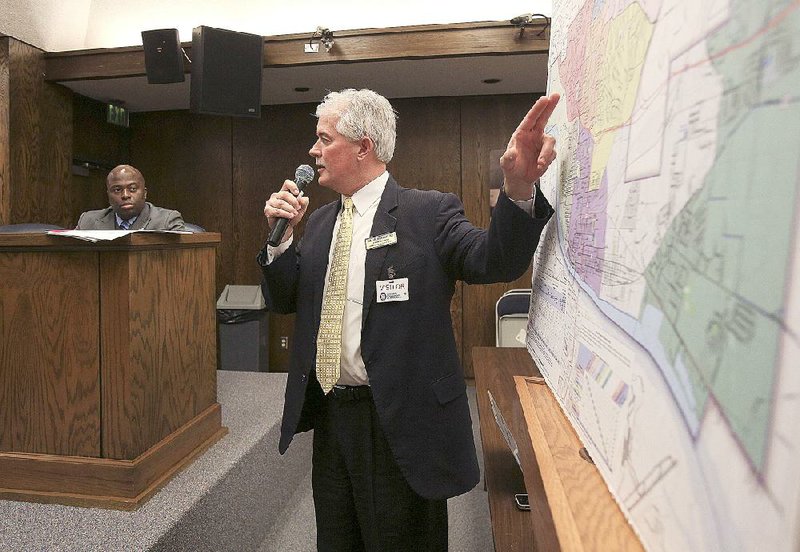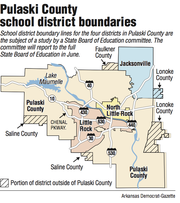The superintendents of the Little Rock and North Little Rock school districts on Wednesday urged a state committee to consider expanding their district boundaries to their city limits, while Pulaski County Special and Jacksonville district leaders argued for keeping existing district lines intact.
The superintendents of the four districts made their appeals to an Arkansas Board of Education committee that is studying the boundary lines in the county and will report its findings and make any recommendations for changes to the entire Education Board, probably in June.
"They all want pieces of my pie!" Pulaski County Special district Superintendent Jerry Guess said lightheartedly about the Little Rock and North Little Rock proposals, which would add tax base and students from the Pulaski County Special district to their districts.
"I think the districts should be left, at least in the short term, as they are," Guess told Education Board members at the Wednesday session. "For the first time in a long time, the districts here are poised to be able to act as other school districts in Arkansas act."
But Guess also suggested that at least some of Pulaski County's districts could be governed most efficiently and effectively by the state education commissioner and the Arkansas Department of Education instead of locally elected boards. The Pulaski County Special and Little Rock districts, two of the three biggest districts in the state, are currently operating under state control -- Pulaski County Special since 2011 and Little Rock since Jan. 28.
The Education Board committee listened to the reports of the superintendents and reviewed district and city maps provided by the Metroplan council of local governments, but took no action Wednesday.
The committee will meet again April 8 to hear from legislators and representatives of the Sherwood, Maumelle, Scott and Shannon Hills communities, which have interest in how school systems in the county are organized.
Guess told the Education Board committee and its chairman, Jay Barth of Little Rock, that the Little Rock and North Little Rock districts are no longer under federal court supervision for their desegregation efforts and, while Pulaski County Special and Jacksonville/North Pulaski remain under that supervision, they are working toward release from court oversight.
"For the first time in a long time, the school districts will be able to operate without the many complications of that court supervision and the attendant ... attraction it has brought," Guess said in defending current boundary lines. "It's kind of a hard thing to say, but I think the worst thing that ever happened to education in this county was the desegregation litigation and the desegregation settlement, surpassed only perhaps by the 1957 Little Rock Central High crisis.
"The first and foremost problem was the image that that brought to the county," he said of the desegregation case. "Everyone else in the state hates the Pulaski County school districts," Guess said.
The Little Rock, North Little Rock and Pulaski County Special districts have received well over $1 billion in special state desegregation aid over the course of the 32-year-old school desegregation lawsuit, and the special funding will continue through the 2017-18 school year. The state in 1989 and 2014 settlement agreements committed to the payments to compensate for its part in violating the U.S. Constitution and promoting racial segregation of students among the Little Rock, North Little Rock and Pulaski County Special districts.
Guess said he wasn't disparaging the need for the desegregation litigation and the corrective actions but noted that when he was appointed to his job in 2011, he found a district "mired in a culture of inefficiency, waste and corruption" that he attributed to having an enormous amount of money and no restrictions on how it should be spent.
He said the Pulaski County districts should be allowed to operate educationally like other districts, but "because of the history here," state oversight should continue as a way to correct problems.
"I don't know any other governance model that would help the districts recover to normal operations more quickly," Guess said, adding that further fragmenting of the districts is not the answer.
In the alternative to leaving the existing boundaries intact, Guess said there should be just one countywide school system in Pulaski County, governed by the state.
Kelly Rodgers, the superintendent of the North Little Rock district since July 2013, described for the committee the different areas surrounding his school district that are in the North Little Rock city limits but in the Pulaski County Special district. That includes the Union Pacific Railroad yards that jut into the heart of the North Little Rock district but are in the Pulaski County Special district tax base. Other areas are along Maumelle Boulevard, which is west of the district, and areas that are east of the district, including new housing developments toward the Scott community.
"We are interested in securing our boundaries consistent with the city of North Little Rock," Rodgers said, noting that the district is in the midst of a capital-improvement program that will result in one high school for 3,000 students, one middle school and nine elementaries, each of which will house 500 or more pupils.
"We have room for growth, and we have room to bring in some of those areas," Rodgers said.
He also said families in some of those areas outside the district boundaries have expressed interest in becoming part of the North Little Rock district.
Rodgers said the district's patrons would not be supportive of losing the North Little Rock system to a larger, countywide district.
Dexter Suggs, the Little Rock superintendent since July 2013 who was made interim chief as the result of the state takeover, told the committee that the Little Rock district's greatest area of enrollment growth is on the western edge.
As a result, the district has "a great need" for a new middle school as well as another new elementary school in the area and possibly a high school. He said expanding the western boundaries to the city limits would be helpful.
Bobby Lester, the superintendent for the Jacksonville/North Pulaski system that was created by the state board in November, described for the committee the 30-year effort by leaders in the community to establish their own district.
"To throw us back into the mix [of reorganizing school districts] would be a huge blow," Lester said. He asked that the state Education Board stand with its earlier decisions on the Jacksonville/North Pulaski School District.
Barth asked the school district leaders for the pros and cons of establishing one district south of the Arkansas River that would be a combination of the Little Rock district and a part of the Pulaski County Special district.
Guess said a district south of the river would have a greater percentage of minority students, including black and Hispanic students, and a greater percentage of poor students than would one or more districts north of the river. He said the schools north of the river would be majority white and middle class.
Education Board member Diane Zook of Melbourne said the Little Rock district has a much higher property-tax base than the rest of the county, an estimated $2.6 billion compared with Pulaski County Special's $1.94 billion, North Little Rock's $582 million and Jacksonville's $299 million, according to Metroplan figures for 2014.
The state Board of Education voted to study Pulaski County's school district boundary lines at the same Jan. 28 meeting that it voted 5-4 to take over the Little Rock district on the basis of he district's having six academically distressed schools.
If the Education Board proposes any changes to school district lines within the county, it would need approval from U.S. District Judge D. Price Marshall Jr. because the Pulaski County Special district remains under federal court supervision in the 34-year-old desegregation case.
A January 2014 settlement in the Pulaski County school desegregation lawsuit obligates the state to "oppose the creation of any other school districts from PCSSD's territory until PCSSD is declared fully unitary and is released from federal court supervision."
Metro on 03/12/2015

